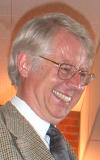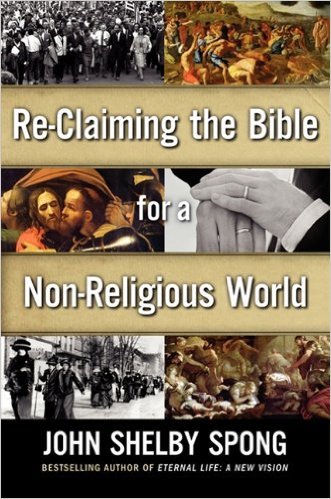Sep 19
Session 1 |
BOOK READINGS - not req'd yet
AN EVENING OF INTRODUCTIONS - to each other, to the themes of the books, to the authors.
OPENING- Cantus - "Wanting Memories" Ysaye Barnwell. LINK
PRESENTATION - LINK - (PDF format includes links)
MEDIA LINKS
1. Video to introduce John Shelby Spong - excerpt. full
clip LINK
"Biblical
Literalilsm - a gentile heresy"
2. Video to introduce modern Biblical Scholarship - excerpt. full clip LINK
"How to
Read the Bible and Still be a Christian" by John Dominic Crossan.
QUESTIONS FOR DISCUSSION:
1. What would you like to see as an element in this course?
REFERENCES:
1. Review - Wayne Holst - Review in his Colleague's List: LINK
2. Review - Progressive Christianity - LINK
3. Chapters link to book: LINK:
4. Amazon link to book: LINK.
5. Progressive Christianity - "How to Read the Bible:
A Progressive Christian Guide" Jim Burklo - LINK
6. Bishop John Shelby Spong links:
1. His own website: LINK
2. His Facebook page: LINK
CLOSING: Vocal Essence and Sweet Honey in the Rock - "We Who Believe in Freedom Cannot Rest" - LINK |
| NOTE: |
RECLAIMING THE BIBLE FOR A NON-RELIGIOUS WORLD - A 23 page COMMENTARY
By Michael Grammer
These notes were contributed by Michael Grammer of Toronto. Michael is a friend and correspondent to our Deb Charnuski.
He is Jewish and so presents a unique view of Spong’s book, all the more
since one of Spong’s main points, is that the early Christians were Jew’s
whose religious experience was in the synagogue, well before there were
churches.
This one document is linked on each of the following session sections.
Just check the page references he has provided.
If you appreciate his 23 page commentary on the book and are further interested
in the points he raises, drop him an email. < msgrammer@rogers.com > |
Sep 26
Session 2 |
BOOK READINGS
PART I - SETTING THE STAGE: POSING THE PROBLEM
PART II - THE FORMATION OF THE TORAH
Chapters 1 - 6
OPENING - Margie Oakander - LINK
PRESENTATION - LINK - (PDF format includes links)
COMMENTARY - Mike Grammer - LINK
MEDIA LINKS
1. Progressive Christianity - Review - "A
Short History of Myth" by Karen Armstrong - LINK
2. NOVA PBS Documentary - The Bible’s Buried Secrets - Moses’ Torah - LINK
3. Arianna's Bat Mitzvah - Torah Reading - LINK
4. Rolf Stengl found the TED talks of Michael Shermer,
a noted sceptic, of interest.
a. Why people believe weird things - LINK
b. The pattern behind self deception - LINK
QUESTIONS FOR DISCUSSION:
1. Spong says history is only written when a nation
becomes established. Really?
2. Does knowing the 2 stories 2 gods 2 histories
backgrounding the Torah change our readings in church?
3. What is your understanding now of the “word
of god”?
4. What value has our Christian claim on the Torah?
CLOSER - Sally Hodges - LINK
|
Oct 3
Session 3 |
BOOK READINGS
PART III - THE RISE OF THE PROPHETS
PART IV - INTRODUCING THE WRITING PROPHETS
Chapters 7 - 14
OPENING - Florence Rachansky - LINK
PRESENTATION - LINK - (PDF format includes links)
COMMENTARY - Mike Grammer - LINK
MEDIA LINKS
1. Walter Brueggemann’s Price Lecture at Trinity Episcopal Church
in Boston March 2014 (2:37:46)
The Prophetic Tradition
of the Hebrew Bible LINK (last 10 min shown)
QUESTIONS FOR DISCUSSION:
1. Who out of middle history would you call prophets?
2. Who out of recent history would you call prophets?
3. Who today would you call a prophet?
4. Can most of the declarations of the prophets
be best described as hindsight reactions to historical experiences?
|
Oct 10
|
Thanksgiving - no bookclub |
Oct 17
Session 4 |
BOOK READINGS
PART V THE MINOR PROPHETS: THE BOOK OF THE TWELVE
PART VI - THE BIBLE’S PROTEST LITERATURE
Chapters 15-22
PRESENTATION - LINK - (PDF format includes links)
COMMENTARY - Mike Grammer - LINK
MEDIA LINKS - Common Theme "Speaking Truth to Power"
1. “Quakers Speak” Trayce Peterson, Director of
Multicultural Affairs at Earlham College
Student Activism
as Prophetic Ministry. LINK
2. "Speaking Truth to Power", Noam Chomsky at Brussels Conference Mar 2011. LINK
Organised by Bruxelles Laïque asbl, Editions Aden, Editions EPO,
Comac et le Centre
d'Histoire et de Sociologie des Gauches
3. "Speak Truth to Power - Moral Courage", Kerry Kennedy, LINK
Pres. Robert F Kennedy
Foundation of Europe, TEDx Conference, Lecce, Italy Del 2012
4. '"Speak Truth to Power", Ariel Dorfman on writing the play for Kerry Kennedy LINK
5. "Speak Truth to Power", Martin Schulz reading Elie Weisel from Ariel Dorfman's play "Speak Truth to Power".
for the other 12
voices in the presentation to EU parliament. Mar 2014. LINK
QUESTIONS FOR DISCUSSION:
1. Why is the "sinner" in Hosea a woman
and the just one, a man?
2. Why are so many contemporary clergy still content
to teach about a theistic god who intervenes in life?
3.Are Spong’s detailed stories from the New Testament
accurate or a loose paraphrasing? |
Oct 24
Session
5 |
BOOK READINGS -
PART VII - LITURGICAL BOOKS AND WISDOM LITERATURE
Chapters 23 - 26
OPENING- Dorothy Duker read the 78 Psalm - Tell Me a Story - - LINK
or possibly Psalm 96 - A Hero's Welcome -
LINK - so here are both
from Jim Taylor's Everyday Psalms
PRESENTATION - LINK - (PDF format includes links)
COMMENTARY - Mike Grammer - LINK
MEDIA LINKS
1. Psalm 23 - From the Scottish Psalter (1912).
This Psalter Choir is composed of members
of the Protestant Reformed Churches in America LINK
2. Everyday Psalms by Jim Taylor. A beautiful transliteration of the psalms.
3. Jim also blogs. He calls the recent judgement
of Greta Vosper an Inquisition. LINK.
4. The Apocrypha and Pseudepigrapha - the additional.books
in the Hebrew and the Catholic Bibles.
from the Jewish Virtual
Library. LINK. Recommend Maccabees.
5. Holy Rascals -Rabbi Salman Schachter-Shalomi
Psalm 23 explained
- The Lord Is My Sheperd LINK
6. John Rutter’s "The Lord Is My Sheperd" LINK
7. John Rutter describing his Requiem as it included Psalm 23 - LINK
CLOSING: |
Oct 31
Session 6 |
BOOK READINGS -
PART VIII - INTRODUCING THE CHRISTIAN SCRIPTURES, (NEW TESTAMENT)
Chapters 27 - 30
OPENING
PRESENTATION - LINK - (PDF format includes links)
COMMENTARY - Mike Grammer - LINK
TIMELINE - Ken Kittridge - LINK
MEDIA LINKS
1. Jesse Herriott interviews John Spong - on Jesus - Excerpts. Full clip LINK
2. Article with Timeline 6 BCE to 90 CE LINK
3. The archeological history of the Capurnaum Synagogue. Virtual Jewish Library. LINK
4. Chris White - "Is Jesus Real? - Non-biblical
Evidence of His Existence".
Excellent research and presentation by layman. 10 sources. 36m LINK
5. Chris White's website. LINK
6. Lecture by Professor Bart D. Ehrman, "Jesus, the Law and a New Covenant" LINK
Ehrman is not a Christian,
but is an expert on New Testament.. A prolific and popular writer/speaker.
QUESTIONS FOR DISCUSSION:
1.Why is it important to examine the bible using both the historical and biblical chronology?
2. Why is the oral Period (30-50), aka “Dark Tunnel”
Important to examine?
CLOSING: Deb reads Mike of Toronto - LINK |
Nov 7
Session
7 |
BOOK READINGS -
PART IX - PAUL: THE FIRST NEW TESTAMENT WRITER
Chapters 31 - 41
OPENIING-
PRESENTATION - LINK - (PDF format includes links)
COMMENTARY - Mike Grammer - LINK
MEDIA LINKS
1. The Search for the Historical Paul - John Dominic
Crossan. LINK
2. The First Christians - Documentary by
Lost Worlds - LINK
QUESTIONS FOR DISCUSSION:
CLOSING - Joan Gray - LINK |
Nov 14
Session 8 |
BOOK READINGS -
PART X - THE SYNOPTIC GOSPELS
Chapter 42 - 51
OPENIING-
PRESENTATION - LINK - (PDF format includes links)
COMMENTARY - Mike Grammer - LINK
MEDIA LINKS
1. John Spong at Chatauqua "Recasting the
Christ Story" LINK
2. The Jewish Liturgical Calendar for year 5777 (CE 2016-2017) LINK
3. The Revised Common Lectionary - Year C beginning Advent LINK
4. The Historical Jesus - John Dominic Crossan. LINK
5. Legends, Fictions, and the Manuscripts That Illustrate Christ's Story - Bart D. Ehrman. LINK
6. The Explosion of Early Christianity Explained. (math) LINK
7. Bible Gateway - 114 Bible versions/languages,
all searchable. LINK
8. Passover - 4m - Animation produced by Crossroads Kids Club - LINK
Illustrates the way
New Testament uses the story models of the Hebrew Bible - (Mishnah).
9. Graphic - Rolf Stengl - In the End, What Matters - LINK
QUESTIONS FOR DISCUSSION:
1. Do you favour Paul or the Gospels as the most
useful portrayal of the teachings of Jesus?
CLOSING:
Leonard Cohen - "Hallelujah" - London
performance 2009 - LINK
(Cohen died this week 7 Nov 2016).
The lyrics of the London performance - LINK.
Rolling Stone article - “How Leonard Cohen’s “Hallelujah’
brilliantly mingled Sex, Religion" - LINK`` |
Nov 21
Session
9 |
BOOK READINGS -
PART XI - THE PASTORAL EPISTLES, HEBREWS AND THE GENERAL EPISTLES
Chapter 52 - 54
OPENIING-
PRESENTATION - LINK - (PDF format includes links)
COMMENTARY - Mike Grammer - LINK
MEDIA LINKS
1. The Teaching of the Apostles - Didache - Text LINK - Wikipedia LINK
2. Video - Ron Rolheiser OMI, June 2016, Walking
in Light and Darkness
from Seminar - Fervor and
Dark Nights in Our Spiritual Journey. LINK
3. Poem - Credo 2 - intention - LINK
QUESTIONS FOR DISCUSSION:
1. Has the institutionalization of the church been
a positive influence?
CLOSING: |
Nov 28
Session
10 |
BOOK READINGS -
PART XII - THE JOHANNINE CORPUS
Chapter 55 - 59
OPENIING- Hallelujah - Cohen - Cor Clanaethwy Community Choir, North Wales - LINK
PRESENTATION - LINK - (PDF format includes links)
COMMENTARY - Mike Grammer - LINK
COURSE SUMMARY - Ken Kitteridge - LINK
HANDOUT - A Second Naivete - Article in Globe and Mail - 19 Nov 2016
"Attendance Increasing at Theologically Conservative
Churches - Joe Friesen. LINK
NEXT STUDY INFO
1. How Jesus Became God - Ehrman - Excerpt - TOC and Introduction. LINK
2. Review by Publisher and by Wayne Holst - LINK.
MEDIA LINKS
1. Article, Huffington Post, "Gospel of John: What everyone should know" - LINK
2. John Spong - Jesus for the Non-Religious, in conversation with Allan Gregg TV Ontario. Nov 2012. LINK
3. Book Study 29 - Revelations by Elaine Pagels - Cross LINK
QUESTIONS FOR DISCUSSION:
1. What discoveries about the Bible have I made
after this study?
2. What difference will it make? For Me? For St.
Davids?
CLOSING: |

 Internet Discussion Group at Yahoo - the St. David's Forum. The archive is public and readable. Participation is by invitation. Click
HERE if you would like to join. You will then be able to post your own responses
to the list and will be emailed the notices and contributions of the others.
Click left to visit the archives of the site (read only). There are presently
88 persons.
Internet Discussion Group at Yahoo - the St. David's Forum. The archive is public and readable. Participation is by invitation. Click
HERE if you would like to join. You will then be able to post your own responses
to the list and will be emailed the notices and contributions of the others.
Click left to visit the archives of the site (read only). There are presently
88 persons. EMAIL WAYNE
EMAIL WAYNE  EMAIL JOCK
EMAIL JOCK